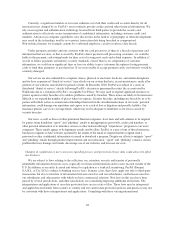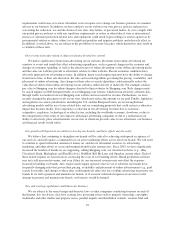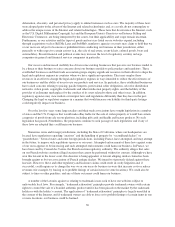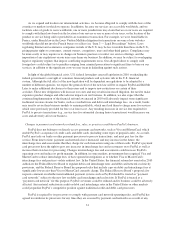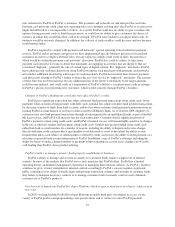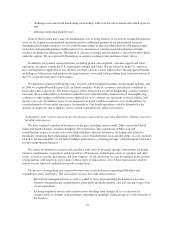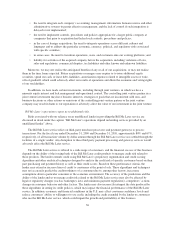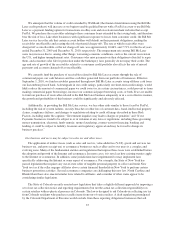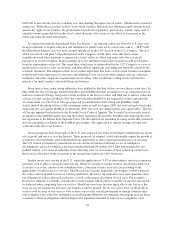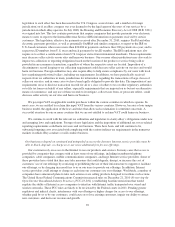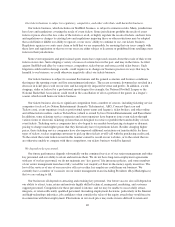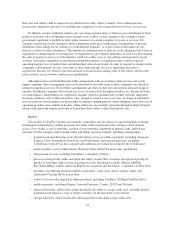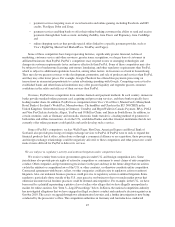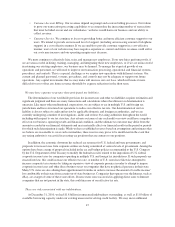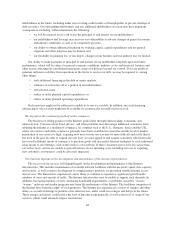eBay 2010 Annual Report Download - page 43
Download and view the complete annual report
Please find page 43 of the 2010 eBay annual report below. You can navigate through the pages in the report by either clicking on the pages listed below, or by using the keyword search tool below to find specific information within the annual report.$100,000 or less into the state in a calendar year, thus limiting the impact on our sellers. Oklahoma has enacted a
similar law. While the recent laws in New York, North Carolina, Rhode Island, Oklahoma and Colorado do not
specifically apply to our business, the proliferation of such state legislation, particularly as many states seek to
expand revenues generated by broader taxes, could adversely affect some of our sellers at some point in the
future and indirectly harm our business.
In conjunction with the Streamlined Sales Tax Project — an ongoing, multi-year effort by U.S. state, and
local governments to require collection and remittance of remote sales tax by out-of-state sellers — H.R. 5660,
the Main Street Fairness Act, was most recently introduced in the 111th Session of the U.S. Congress. The Act,
which was not enacted prior to the adjournment of the Congress, would allow states that meet certain
simplification and other standards to require out-of-state sellers to collect and remit sales taxes on goods
purchased by in-state residents. Sellers meeting an as yet undefined small seller exception would be excluded
from the requirements of the Act. This legislation, which may be reintroduced in the 112th Congress as a way to
enable states to increase sales tax revenues and help address significant state budgetary shortfalls caused by the
economic downturn. The adoption of this Act or similar legislation that lacks a robust small business exemption
would result in the imposition of sales taxes and additional costs associated with complex sales tax collection,
remittance and audit compliance requirements on our sellers. This would make selling on our websites less
attractive for small retailers, and would harm our business.
From time to time, some taxing authorities have notified us that they believe we owe them certain taxes. In
May 2008, the City of Chicago notified both eBay and StubHub that they are liable for a city amusement tax on
tickets to events in Chicago, irrespective of the location of the buyer or seller, and filed suit to enforce collection
of taxes it claims are due. In March 2009, the court ruled that StubHub is not required to collect and remit the
city amusement tax. The City of Chicago requested reconsideration of this ruling and StubHub sought
clarification of the ruling relative to the remaining counts as well. In August 2009, the court entered a final order
dismissing the case against StubHub. In December 2009, the court also dismissed the case against eBay. The City
of Chicago appealed both matters to the Seventh Circuit Court of Appeals. The Seventh Circuit recently issued
an opinion in the StubHub matter rejecting the federal arguments advanced by StubHub and certifying the state
law arguments to the Illinois State Supreme Court. The Seventh Circuit is holding its ruling on the eBay matter in
abeyance pending a resolution of the StubHub proceedings. The application of similar existing or future laws
could adversely affect our business.
Several proposals have been made at the U.S. state and local level that would impose additional taxes on the
sale of goods and services over the Internet. These proposals, if adopted, could substantially impair the growth of
ecommerce and our brands, and could diminish our opportunity to derive financial benefit from our activities.
The U.S. federal government’s moratorium on state and local taxation of Internet access or multiple or
discriminatory taxes on ecommerce has been extended through November 2014. This moratorium does not
prohibit federal, state, or local authorities from collecting taxes on our income or from collecting certain taxes
that were in effect prior to the enactment of the moratorium and/or one of its extensions.
Similar issues exist outside of the U.S., where the application of VAT or other indirect taxes on ecommerce
providers such as eBay is uncertain and evolving. While we attempt to comply in those jurisdictions where it is
clear that a tax is due, certain of our subsidiaries have, from time to time, received claims relating to the
applicability of indirect taxes to our fees. Should such taxes become applicable, our business could be harmed.
We collect and remit indirect taxes in certain jurisdictions. However, tax authorities may raise questions about
our obligation to collect and remit such taxes, as well as the proper calculation of such taxes. For example, a
Korean tax authority is currently asserting that certain coupons and incentives available on our sites should not
be deducted when computing taxes on our fees. Should any new taxes become applicable to our fees or if the
taxes we pay are found to be deficient, our business could be harmed. We do not collect taxes on the goods or
services sold by users of our services. One or more states or the federal government or foreign countries may
seek to impose a tax collection, reporting or record-keeping obligation on companies that engage in or facilitate
ecommerce. Such an obligation could be imposed by legislation intended to improve tax compliance (and
38


